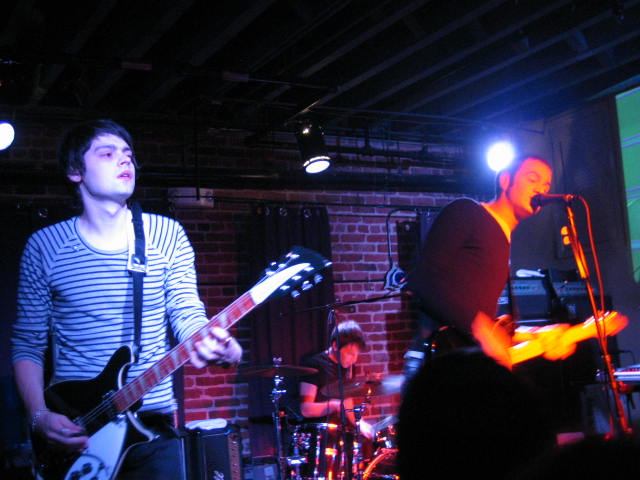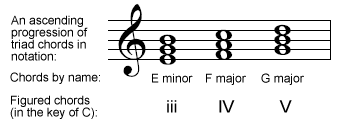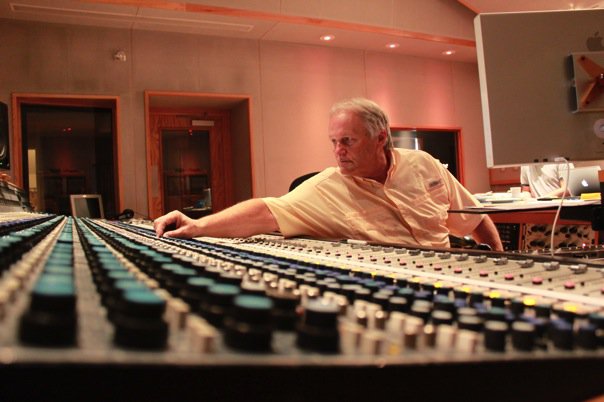|
Smokers Outside The Hospital Doors
"Smokers Outside the Hospital Doors" is the first single from English rock band Editors' second album, '' An End Has a Start'' (2007). It was released as a digital download on 11 June 2007 and as a physical single through CD and vinyl on 18 June 2007 in the United Kingdom. It peaked at number seven on the UK Singles Chart in its first week of physical release and became a moderate to minor hit in Belgium, Ireland, and the Netherlands. A single was also released in the US on 26 June 2007. The song was set to debut on Zane Lowe's show on 30 April; however, the song leaked on the internet a few days preceding. Production The song was recorded and produced at Grouse Lodge Studios, Ireland, under the supervision of producer Jacknife Lee. Lead vocals, rhythm guitar and piano were provided by Tom Smith, lead guitar and synth by Chris Urbanowicz, bass guitar by Russell Leetch and percussion by Ed Lay. Smith and Lay were also part of the choir, along with producer Jacknife Lee, audio e ... [...More Info...] [...Related Items...] OR: [Wikipedia] [Google] [Baidu] |
Editors (band)
Editors are an English rock band, formed in 2002 in Birmingham. Previously known as Pilot, The Pride and Snowfield, the band currently consists of Tom Smith (lead vocals, guitar, piano), Russell Leetch (bass guitar, synthesiser, backing vocals), Ed Lay (drums, percussion, backing vocals), Justin Lockey (lead guitar), Elliott Williams (keys, synthesizers, guitars, and backing vocals), and Benjamin John Power (composer and producer). Editors have so far released two platinum studio albums, and six in total, with several million combined sales. Their debut album '' The Back Room'' was released in 2005. It contained the hits "Munich" and "Blood" and the following year received a Mercury Prize nomination. Their follow-up album '' An End Has a Start'' went to number 1 in the UK Album Chart in June 2007 and earned the band a Brit Awards nomination for best British Band. It also spawned another Top 10 hit single, "Smokers Outside the Hospital Doors". The band's third album, ''In Thi ... [...More Info...] [...Related Items...] OR: [Wikipedia] [Google] [Baidu] |
Rock Music
Rock music is a broad genre of popular music that originated as " rock and roll" in the United States in the late 1940s and early 1950s, developing into a range of different styles in the mid-1960s and later, particularly in the United States and United Kingdom.W. E. Studwell and D. F. Lonergan, ''The Classic Rock and Roll Reader: Rock Music from its Beginnings to the mid-1970s'' (Abingdon: Routledge, 1999), p.xi It has its roots in 1940s and 1950s rock and roll, a style that drew directly from the blues and rhythm and blues genres of African-American music and from country music. Rock also drew strongly from a number of other genres such as electric blues and folk, and incorporated influences from jazz, classical, and other musical styles. For instrumentation, rock has centered on the electric guitar, usually as part of a rock group with electric bass guitar, drums, and one or more singers. Usually, rock is song-based music with a time signature using a verse–chorus form, ... [...More Info...] [...Related Items...] OR: [Wikipedia] [Google] [Baidu] |
Choir
A choir ( ; also known as a chorale or chorus) is a musical ensemble of singers. Choral music, in turn, is the music written specifically for such an ensemble to perform. Choirs may perform music from the classical music repertoire, which spans from the medieval era to the present, or popular music repertoire. Most choirs are led by a conductor, who leads the performances with arm, hand, and facial gestures. The term ''choir'' is very often applied to groups affiliated with a church (whether or not they actually occupy the quire), whereas a ''chorus'' performs in theatres or concert halls, but this distinction is not rigid. Choirs may sing without instruments, or accompanied by a piano, pipe organ, a small ensemble, or an orchestra. A choir can be a subset of an ensemble; thus one speaks of the "woodwind choir" of an orchestra, or different "choirs" of voices or instruments in a polychoral composition. In typical 18th century to 21st century oratorios and masses, 'choru ... [...More Info...] [...Related Items...] OR: [Wikipedia] [Google] [Baidu] |
Break (music)
In popular music, a break is an instrumental or percussion section during a song derived from or related to stop-time – being a "break" from the main parts of the song or piece. A break is usually interpolated between sections of a song, to provide a sense of anticipation, signal the start of a new section, or create variety in the arrangement. Jazz A solo break in jazz occurs when the rhythm section (piano, bass, drums) stops playing behind a soloist for a brief period, usually two or four bars leading into the soloist's first improvised solo chorus (at which point the rhythm section resumes playing). A notable recorded example is sax player Charlie Parker's solo break at the beginning of his solo on "A Night in Tunisia". While the solo break is a break for the rhythm section, for the soloist, it is a solo cadenza, where they are expected to improvise an interesting and engaging melodic line. DJing and dance music In DJ parlance, in disco, hip hop and electronic dance m ... [...More Info...] [...Related Items...] OR: [Wikipedia] [Google] [Baidu] |
Bridge (music)
In music, especially Western popular music, a bridge is a contrasting section that prepares for the return of the original material section. In a piece in which the original material or melody is referred to as the "A" section, the bridge may be the third eight-bar phrase in a thirty-two-bar form (the B in AABA), or may be used more loosely in verse-chorus form, or, in a compound AABA form, used as a contrast to a full AABA section. The bridge is often used to contrast with and prepare for the return of the verse and the chorus. "The b section of the popular song chorus is often called the ''bridge'' or ''release''." Etymology The term comes from a German word for bridge, ''Steg'', used by the Meistersingers of the 15th to the 18th century to describe a transitional section in medieval bar form. The German term became widely known in 1920s Germany through musicologist Alfred Lorenz and his exhaustive studies of Richard Wagner's adaptations of bar form in his popular 19th-cent ... [...More Info...] [...Related Items...] OR: [Wikipedia] [Google] [Baidu] |
Segue
A segue (; ) is a smooth transition from one topic or section to the next. The term is derived from Italian ''segue'', which literally means "follows". In music In music, ''segue'' is a direction to the performer. It means ''continue (the next section) without a pause''. The term attacca is used synonymously. For written music, it implies a transition from one section to the next without any break. In improvisation, it is often used for transitions created as a part of the performance, leading from one section to another. In live performance, a segue can occur during a jam session, where the improvisation of the end of one song progresses into a new song. Segues can even occur between groups of musicians during live performance. For example, as one band finishes its set, members of the following act replace members of the first band one by one, until a complete band swap occurs. In recorded music, a segue is a seamless transition between one song and another. The effect is oft ... [...More Info...] [...Related Items...] OR: [Wikipedia] [Google] [Baidu] |
Chord Progression
In a musical composition, a chord progression or harmonic progression (informally chord changes, used as a plural) is a succession of chords. Chord progressions are the foundation of harmony in Western musical tradition from the common practice era of Classical music to the 21st century. Chord progressions are the foundation of Western popular music styles (e.g., pop music, rock music), traditional music, as well as genres such as blues and jazz. In these genres, chord progressions are the defining feature on which melody and rhythm are built. In tonal music, chord progressions have the function of either establishing or otherwise contradicting a tonality, the technical name for what is commonly understood as the "key" of a song or piece. Chord progressions, such as the common chord progression I–vi–ii–V, are usually expressed by Roman numerals in Classical music theory. In many styles of popular and traditional music, chord progressions are expressed using the name and " ... [...More Info...] [...Related Items...] OR: [Wikipedia] [Google] [Baidu] |
Backing Track
A backing track is an audio recording on audiotape, CD or a digital recording medium or a MIDI recording of synthesized instruments, sometimes of purely rhythmic accompaniment, often of a rhythm section or other accompaniment parts that live musicians play along with or sing along to. Backing tracks enable singers and bands to add parts to their music which would be impractical or impossible to perform live, such as string section or choir parts which were recorded in the studio. A backing track can be used by a one person band (e.g., a singer-guitarist) to add any amount of bass, drums and keyboards to their live shows without the cost of hiring extra musicians. A small pop group or rock band (e.g., a power trio) can use backing tracks to add a string section, horn section, drumming or backing vocals to their live shows. Uses Bands or solo musicians may use backing tracks to add extra instrumental or vocal tracks to a live performance, to enhance the sound (as in the employment ... [...More Info...] [...Related Items...] OR: [Wikipedia] [Google] [Baidu] |
Newcastle-upon-Tyne
Newcastle upon Tyne ( RP: , ), or simply Newcastle, is a city and metropolitan borough in Tyne and Wear, England. The city is located on the River Tyne's northern bank and forms the largest part of the Tyneside built-up area. Newcastle is also the most populous city of North East England. Newcastle developed around a Roman settlement called Pons Aelius and the settlement later took the name of a castle built in 1080 by William the Conqueror's eldest son, Robert Curthose. Historically, the city’s economy was dependent on its port and in particular, its status as one of the world's largest ship building and repair centres. Today, the city's economy is diverse with major economic output in science, finance, retail, education, tourism, and nightlife. Newcastle is one of the UK Core Cities, as well as part of the Eurocities network. Famous landmarks in Newcastle include the Tyne Bridge; the Swing Bridge; Newcastle Castle; St Thomas’ Church; Grainger Town including Grey's M ... [...More Info...] [...Related Items...] OR: [Wikipedia] [Google] [Baidu] |
BBC 6 Music
BBC Radio 6 Music is a British digital radio station owned and operated by the BBC, specialising primarily in alternative music. BBC 6 Music was the first national music radio station to be launched by the BBC in 32 years. It is available only on digital media: DAB radio, BBC Sounds, digital television, and throughout northern and western Europe through the Astra 2B satellite. BBC 6 Music has been described as a "dedicated alternative music station". Many presenters have argued against the perception that the main focus is indie guitar music. The station itself describes its output as "the cutting edge music of today, the iconic and groundbreaking music of the past 40 years and unlimited access to the BBC's wonderful music archive". Since 2014, an annual music festival, 6 Music Festival, has been held in different cities around the United Kingdom and broadcast live on the station. In July 2010, the BBC Trust announced it had rejected a proposal by the BBC to close 6 Music to ... [...More Info...] [...Related Items...] OR: [Wikipedia] [Google] [Baidu] |
Audio Engineer
An audio engineer (also known as a sound engineer or recording engineer) helps to produce a recording or a live performance, balancing and adjusting sound sources using equalization, dynamics processing and audio effects, mixing, reproduction, and reinforcement of sound. Audio engineers work on the "technical aspect of recording—the placing of microphones, pre-amp knobs, the setting of levels. The physical recording of any project is done by an engineer... the nuts and bolts." Sound engineering is increasingly seen as a creative profession where musical instruments and technology are used to produce sound for film, radio, television, music and video games. Audio engineers also set up, sound check and do live sound mixing using a mixing console and a sound reinforcement system for music concerts, theatre, sports games and corporate events. Alternatively, ''audio engineer'' can refer to a scientist or professional engineer who holds an engineering degree and who designs, dev ... [...More Info...] [...Related Items...] OR: [Wikipedia] [Google] [Baidu] |
Zane Lowe
Alexander Zane Reid Lowe (born 7 August 1973) is a New Zealand radio DJ, live DJ, record producer, and television presenter. After an early career in music creation, production and DJing, he moved to the UK in 1997. He came to prominence through presenting on XFM and MTV Europe (MTV Two), developing a DJ career by opening sets for bands and eventually landing a slot on prime-time radio on BBC Radio 1 from 2003–2015, with the trademark 'Zane Lowe's World Record', airing the UK's best and hottest in music. In 2015, he was head-hunted by Apple to be the Creative Director of their new world-wide music station, Apple Music 1. Early career Born in Auckland, Lowe attended Auckland Grammar School and was a presenter on local music station Max TV. Zane was a member of Urban Disturbance, an early 90s hip hop group whose standout hit was "No Flint No Flame" and Breaks Co-Op, alongside Andy Lovegrove and Hamish Clark. Lowe and Clark formed Breaks Co-Op in Auckland, releasing the elec ... [...More Info...] [...Related Items...] OR: [Wikipedia] [Google] [Baidu] |








